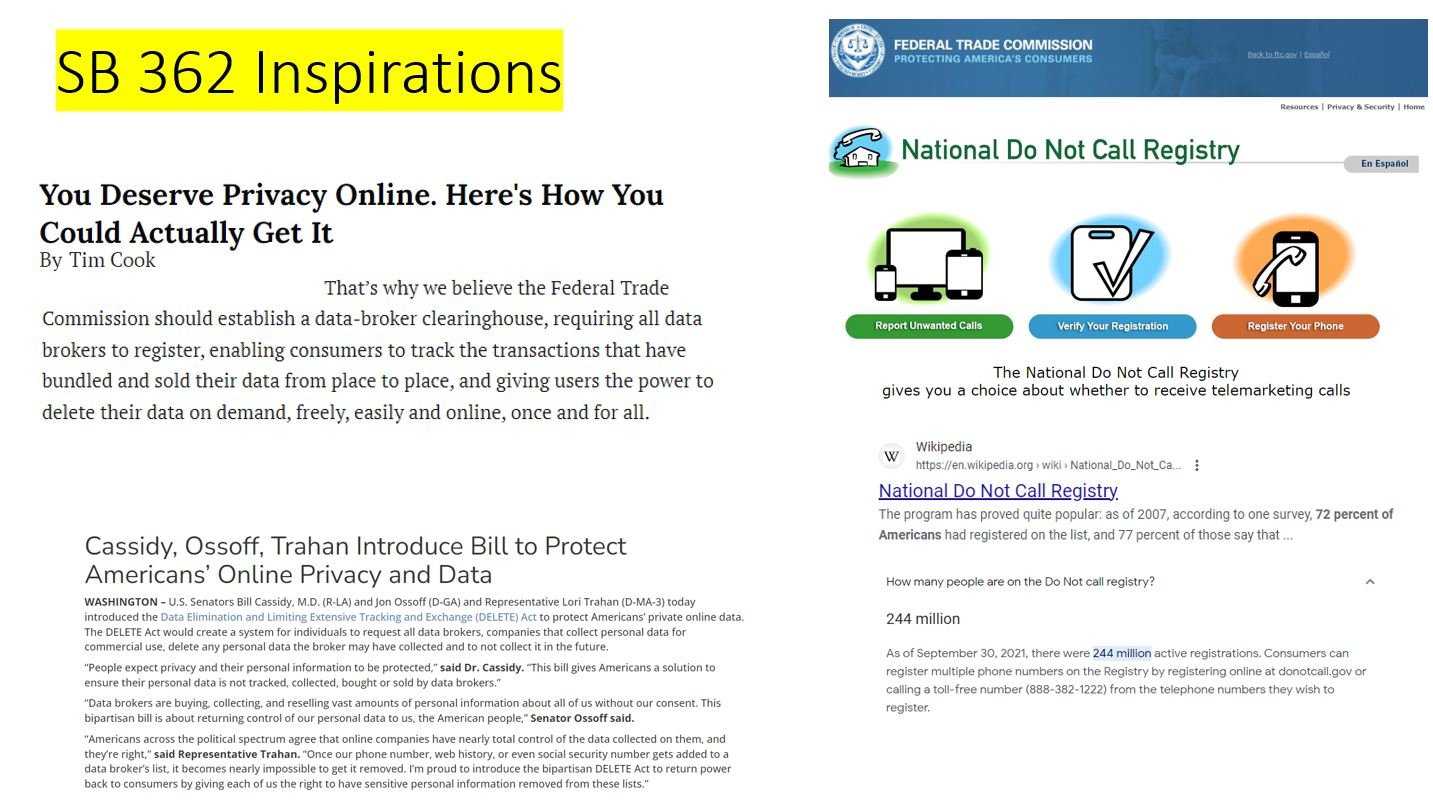Re-intro of Senator Ossoff’s and Cassidy’s DELETE Act Shows Growing Bipartisan Desire To Have Data Brokers Delete Private Info on Request
[Update October 2023: the California Delete Act aka SB 362 was signed into law on October 10, 2023 by Governor Newsom. My analysis of the law can be found here.]
As readers of this blog are aware, I have been beating the drums for the California Delete Act — aka California Senate Bill 362 (SB 362) — which would create an online portal for consumers to request that data brokers delete any data they have on the consumer and no longer track them. [Full disclosure: I proposed the bill to State Senator Josh Becker and co-drafted the bill]. SB 362 builds upon California’s existing data broker registry law and the California Privacy Rights Act and draws inspiration from Senator Ossoff’s and Cassidy’s 2022 federal proposal of a similar name, Apple CEO Tim Cook’s call for a data broker clearinghouse, and the incredibly popular “Do Not Call” registry (operated by the Federal Trade Commission with over 240 million registrants). Well, Senator Ossoff and Cassidy have just now reintroduced the federal Data Elimination and Limiting Extensive Tracking and Exchange (DELETE) Act, showing growing bipartisan momentum behind regulating data brokers. As the DELETE Act is an inspiration behind SB 362, let me talk a bit more about this bill and how there is a growing consensus to give consumers the ability to have a singular mechanism to delete their data from data brokers.
The Federal DELETE Act proposal is one of the key inspirations behind the California Delete Act (SB 362)
Federal DELETE Act
On June 22, 2023, the DELETE Act was re-introduced by Senators Ossoff and Cassidy and Representatives Trahan and Edwards. Per the sponsors
“The DELETE Act would direct the Federal Trade Commission (FTC) to create an online dashboard for Americans to submit a one-time data deletion request that would be sent to all data brokers registered. Under current law, individuals must request removal from each individual data broker to ensure their privacy is protected. This legislation would also create a ‘do not track list’ to protect taxpayers from future data collection. The DELETE Act is supported by Public Knowledge.”
One thing that sticks out is that the bill is a bipartisan proposal — Senator Cassidy and Representative Edwards are Republicans and Senator Ossoff and Representative Trahan are Democrats. The bill is obviously bicameral as well.
The desire to regulate data brokers has grown over the years. As noted by Jessica Rich, a former director in the Federal Trade Commission’s Bureau of Consumer Protection: “Data brokers have long been a concern to policymakers because they collect and sell personal data behind the scenes and consumers have little knowledge or control over their practices.”
The website The Record goes on to note:
Also adding “fuel to the fire,” Rich said, is a report by the Office of the Director of National Intelligence (ODNI), publicly released June 5, on how the government accesses and uses commercially available data.
“I’m not surprised to see bipartisan efforts to give consumers more control over these practices,” Rich said.
The ODNI report set off a furor after intelligence officials admitted government agencies collected commercially available data “on nearly everyone that is of a type and level of sensitivity that historically could have been obtained, if at all, only through targeted (and predicated) collection.” The report said that the intelligence community must address the practice since it “could be used to cause harm to an individual’s reputation, emotional well-being, or physical safety.”
The ODNI report, a Gay/Bi dating app and a Muslim Prayer app selling data on people’s location to a data broker, and a gay priest being outed based on location data bought from a data broker are some of the recent data points pointing to the need to regulate data brokers better.
As I document in my book Containing Big Tech, the unregulated collection and sale of personal data by data brokers represent a threat to immigrants, domestic violence survivors, and reproductive rights.
Growing Bipartisan Support
Historically this push for more regulation over data brokers has come from Democrats, but now it is equally coming from Republicans. Let me give some examples:
Senator Bill Cassidy, a Republican Senator from Louisiana, said Americans need to “ensure their personal data is not tracked, collected, bought or sold by data brokers.”
Republican Chuck Edwards, a Member of Congress from North Carolina, said we need a “platform to easily request that their personal information be deleted and stop further collection by data companies.
Republican Representative Cathy McMorris Rogers, from the State of Washington, was quoted as saying: “People have no say over whether and where their personal data is sold and shared. They have no guaranteed way to access, delete, or correct their data and, they have no ability to stop the unchecked collection of their sensitive personal information.”
Finally, Republican Congresswoman Morgan Griffith of West Virginia also said that “By collecting and selling data at will, data brokers put all Americans at risk.”
So, you can see that when you have a Massachusetts Democrat (Lori Trahan) joining with a Conservative North Carolina Republican (Chuck Edwards), you now have a broad consensus.
The California Version of the DELETE Act
Specific to the California Delete Act, it passed 32-8 in the State Senate in late May of 2023. But no Republican votes for it. It is now on to the State Assembly, where it has a hearing on Tuesday, June 27, 2023, in the Assembly Privacy Subcommittee.
I know I will be curious if the consensus that is building with Republicans at the Federal level will start to be felt at the State level in that some Republican Assemblymembers will also vote yes on SB 362. I will give an update on the vote tomorrow in a blog post.
